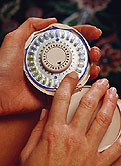 |
 |
 |

'Extended Cycle' Contraception Garners More Interest
But many women still question safety of skipping monthly bleeding|
|
HealthDay
Sunday, August 24, 2008
 SUNDAY, Aug. 24 (HealthDay News) -- With new "extended cycle" and "continuous" oral contraceptives on the market, women today can choose to have monthly withdrawal bleeding just four times a year -- or not at all.
SUNDAY, Aug. 24 (HealthDay News) -- With new "extended cycle" and "continuous" oral contraceptives on the market, women today can choose to have monthly withdrawal bleeding just four times a year -- or not at all.
To many American women of childbearing age, these options have tremendous appeal. In fact, more than two-thirds of women said they are interested in suppressing monthly bleeding, according to national survey results presented at an Association of Reproductive Health Professionals (ARHP) reproductive health conference.
"In the last 10 years, there really has been almost a revolutionary change in the opinions and the views of women regarding menstruation," observed Dr. Lee P. Shulman, professor and chief of reproductive genetics in the Department of Obstetrics and Gynecology at Northwestern University's Feinberg School of Medicine in Chicago.
"It's not just the more mature reproductive women desiring fewer withdrawal bleeds," said Shulman, immediate past chair of the ARHP. "Now that's becoming a more common desire among even younger women seeking hormonal contraception."
Oral contraceptives were initially designed to mimic the natural experience of menstruation. Women took 21 days of "active" pills, containing hormones, and seven days of placebo pills. During the hormone-free week, women experienced withdrawal bleeding, much like a true period.
Today's generation of oral contraceptives includes Seasonale and Seasonique, extended cycle products that reduce bleeding to four times a year, and Lybrel, a continuous-use product that stops monthly bleeding altogether. With Loestrin 24 Fe and Yaz, women still have a monthly bleed, but those "periods" are shorter.
Extended cycling, though, is not a new phenomenon. For years, doctors have being tailoring birth-control regimens to women's needs by having them skip the placebo week of traditional oral contraceptives and go on to a new pack. A woman going on her honeymoon, for example, or being deployed by the military, might seek to avoid bleeding and the need for sanitary protection. Extended regimens have also been used to treat women with endometriosis.
"The only difference recently is that we have these dedicated products," said Patricia Aikens Murphy, associate professor and the Annette Poulson Cumming Presidential Endowed Chair in Women's and Reproductive Health at the University of Utah College of Nursing in Salt Lake City.
Despite mounting interest, women in the survey also expressed some reluctance about the safety of suppressing monthly bleeding. By contrast, 97 percent of physicians who were surveyed said it's medically safe and acceptable.
Shulman attributes women's concerns about whether it's safe and natural to tamper with menstruation to conventional wisdom passed down by mothers and grandmothers. They'll hear about it and say, " 'You're not pregnant; you're supposed to have a period,' or 'Dammit, I had a period for 35 years; you're going to have a period for 35 years,' " he said.
Some women who try extended cycling really like it, because it reduces symptoms such as headache and bloating that occur during the placebo week, Murphy said. And there's some theoretical speculation that overall birth control effectiveness might be improved when women continue to use hormone-containing pills, she added.
"Many failures with birth control pills occur when that seven-day hormone-free interval gets extended longer and women actually run the risk of ovulating -- if you forget to start your pack right when you're supposed to," she explained.
One note of caution, though. These products are associated with a greater frequency of breakthrough bleeding and spotting, Shulman pointed out.
And there are other considerations. It takes most women a few months or more to stop having bleeding, said Susan Wysocki, president and CEO of the National Association of Nurse Practitioners in Women's Health in Washington, D.C.
"I liken it to buying a new pair of shoes," she said. "New shoes take breaking in. But once they are broken in, they are the shoes you like to wear. It takes time to break in a non-cycling contraceptive pill as well."
HealthDay
Copyright (c) 2008 ScoutNews, LLC. All rights reserved.
Related News:
More News on this Date
Related MedlinePlus Pages:
| Home | Health Topics | Drugs & Supplements | Encyclopedia | Dictionary | News | Directories | Other Resources | |
| Disclaimers | Copyright | Privacy | Accessibility | Quality Guidelines U.S. National Library of Medicine, 8600 Rockville Pike, Bethesda, MD 20894 National Institutes of Health | Department of Health & Human Services |
Date last updated: 25 August 2008 |




